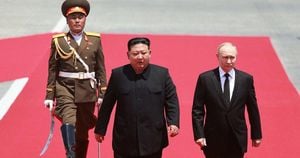Imran Khan, Pakistan's former Prime Minister, is seeking the position of Chancellor at the prestigious University of Oxford, amid significant legal challenges. This position became available following the resignation of Chris Patten, and Khan's candidacy has sparked considerable interest due to his notable background.
Khan graduated from Oxford University in 1975, where he studied philosophy, politics, and economics. With his experience as one of Pakistan's most celebrated cricket players, Khan has long had strong connections to the institution.
His party, Pakistan Tehreek-e-Insaf (PTI), confirmed his application, with spokesperson Sayed Zulfikar Bukhari stating, "Imran Khan had instructed to submit his application, and scrutiny will commence soon." The application for becoming Chancellor is seen as more than just ceremonial; it carries significant prestige.
Other notable candidates for the chancellor position include former UK foreign secretary William Hague and Peter Mandelson, the former EU trade commissioner. The university will finalize its list of candidates by October, with voting expected by the end of the month.
While Khan’s application is gaining traction, it is shadowed by the legal issues he is currently facing. He has been incarcerated for over a year, with various charges against him, including corruption and inciting violence, which he claims are politically motivated.
Khan's push for the chancellorship raises questions about his ability to execute such duties from behind bars. His supporters maintain his vision and leadership would benefit Oxford and its community immensely.
If elected, Khan would be the first individual of Asian descent to hold this prestigious title. His nomination is seen not just as significant for Pakistan, but it would stand as recognition for the entire Asian community.
The political climate surrounding Khan's bid is electric, stirring up discussions on the intertwining nature of politics and academic appointments. His past successes and continued influence keep his name at the forefront of discussions.
Khan's supporters believe he exemplifies the possibility of leadership rising from adversity, showcasing resilience. His candidacy might pave the way for greater representation from diverse communities within elite institutions like Oxford.
Although this nomination could be seen as controversial, it also reflects the changing face of academia where political figures are increasingly involved. Khan’s history of philanthropy and transformational leadership could resonate positively within the academic environment.
The significance of Khan's application isn't lost on observers, as it strikes at the heart of global politics and education. Aspirants like himself, with rich backgrounds, highlight the fusion of social and political capital.
Educators and alumni of Oxford are watching closely, pondering on how Khan’s potential chancellorship would shape the university’s future initiatives. Discussions around academic freedom and political interference have not been absent from the narrative.
Overall, Khan's application for the chancellorship encapsulates broader themes of governance, education, and personal resilience. The outcome of this application could redefine what leadership looks like for future generations.
The road to the chancellorship is fraught with hurdles, yet it showcases Khan’s unwavering determination to remain active within influential circles. His experience and vision could be pivotal for Oxford's direction under his potential leadership.
Whatever the result, this chapter of Khan’s life marks another fascinating turn in the narrative of political figures engaging within academia. The eyes of the world will undoubtedly remain fixed on Oxford as they prepare to make this consequential decision.



